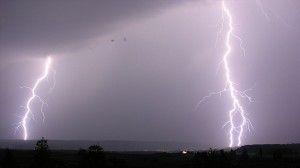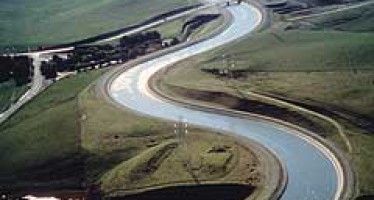L.A. County takes thunder out of rain tax — for now
By Wayne Lusvardi
On March 13, the Los Angeles County Board of Supervisors may have taken the thunder out of the public opposition to its proposed storm water tax, called the Clean Water-Clean Beaches Measure. It voted to postpone and revise the tax.
The opposition was itching for a chance to defeat the tax in an election to be voted on by a mail-in ballots received only by property owners. Mail-in elections typically have a low voter turnout and property owners can more easily mobilize to defeat such a parcel tax.
Now the tax is to be reformulated as a fee for specific storm water cleanup projects and voted on in a general election at the ballot box in 2014. It may be more difficult to defeat a storm-water fee in a general election, where 40 percent of the revenues would go to populist makeshift jobs programs for disadvantaged residents in seven designated watershed areas.
Proposed jobs would include cleaning trash out of storm sewers and parks. Some money would be diveted to storm-water education programs in public schools.
AB 2554
Despite the many flaws in the proposed Clean Water-Clean Beaches tax measure, Los Angeles County supervisors should not be totally blamed. The county was merely complying with Assembly Bill 2554, passed in 2010 by the State Legislature. AB 2554 specifies that 40 percent or more of the tax revenues would have gone to social jobs programs for low-income persons, not for building new water catchment basins.
Another huge problem with the storm water tax was that the state Legislature singled out only Los Angeles County to comply with the tax. The tax was meant to comply with the Federal Clean Water Act. Why only Los Angeles County had to comply with Federal law was never clarified.
The Democrat-controlled Legislature has not signaled that they are about to revise AB 2554 or vote to rescind the law. So look for this ill-conceived tax to resurface again as a fee to be voted upon in a general election at the ballot box.
Original tax
It’s not clear yet what form the new tax will take. But it likely will have many elements of the original tax proposal, which included funding for lobbying organizations, such as Heal the Bay and the Surf-Rider Foundation, to provide built-in support groups for the tax. Anti-tax property owners, apartment owners and small business organizations who would have paid most of the fees would not have been funded.
The original storm water tax proposal would have imposed a tax of only about $54 per year on each single-family home in the seven watershed areas of the county. But it could have imposed a tax of up to $6,273 per year on 104,536 residential duplexes in the county. That would have equated to an overbearing rent increase of $261 per month to each duplex occupant. A small office building would have been hit with a $10,379 tax increase per year. Convalescent homes would have an $8,440 tax increase while churches would have had a $9,353 tax per year imposed. Some large commercial properties on impervious clay soils in downtown Los Angeles could face a $200,000 per year tax increase.
Only tax parcels in each of the seven watershed areas of the County would have been affected. But in the Upper Los Angeles River Watershed, about 75 percent, or 423,136, of the taxed parcels would have been in the city of Los Angeles, which has an official 20.2 percent poverty rate.
Upper Los Angeles River Watershed — Storm Water Parcel Tax
| Watershed Municipalities | Parcel Count | Percent Total | Approximate Square Miles |
| Alhambra | 5,533 | 0.98 | 1.7 |
| Burbank | 28,900 | 5.10 | 14.14 |
| Calabasas | 5,803 | 1.03 | 6.07 |
| Commerce | 4 | 0.001 | 0.03 |
| Glendale | 44,494 | 7.89 | 26.08 |
| Hidden Hills | 781 | 0.14 | 1.68 |
| La Canada | 7,737 | 1.37 | 7.48 |
| Los Angeles | 423,136 | 75.08 | 221.56 |
| Monterey Park | 1,604 | 0.28 | 1.16 |
| Pasadena | 8,312 | 1.47 | 7.48 |
| San Fernando | 5,189 | 0.92 | 1.81 |
| South Pasadena | 6,192 | 1.10 | 2.32 |
| Unincorporated LA County | 25,464 | 4.52 | 227.0 |
| Vernon | 432 | 0.08 | 1.12 |
| 563,581 | 100.0% | 519.64 |
Cities such as Pasadena would be in two different Watershed Areas.
A major concern to property owners was that such taxes would not have been able to be passed through to tenants because of renter opposition and rent controls in the city of Los Angeles. This might have resulted in a mass of property tax reassessment appeals that would have lowered the property tax base in the city of Los Angeles.
Basins
A major problem was where to find available land to build new rainwater catchment basins on every 100 acres within each Watershed Area and the likely need to use eminent domain to acquire the land. Also, buying private land for storm water catchment basins would decrease the county’s property tax base.
Even worse, large commercial property owners that already contain 100 percent of storm water on their properties would have still been taxed 20 percent of the maximum tax. And property owners receiving a tax reduction for already completing storm water improvements on their properties would have to reapply every three years for the tax reduction. The tax reduction would not have been automatic or permanent.
Opposition
Los Angeles County Supervisors temporarily may have taken the thunder out of the opposition to the proposed rainwater tax. But the county now will have to provide information on each specific project for funding, including the jobs, social and education programs. This may provide opponents time to re-strategize to oppose the reformulated storm water fee.
Opponents of the tax will now have to focus on the 40 percent social program component of the stormwater cleanup program and the defects of any of the specific water catch basin project proposed. Another flaw in the county’s revised storm water cleanup program would be that the inability to pass through the fee to renters would likely be crippling to owners of small residential income properties.
Opponents of the county’s proposed storm water tax are now going to have to strike like lightning rather than thunder.
Related Articles
Cities could be stuck with ‘aesthetic’ impacts of High Speed Rail
May 30, 2013 By Wayne Lusvardi Like a train horn, controversy is blaring over efforts to reform the California Environmental Quality Act.
Rainfall study contradicts CA water policy
In the mid-1970s, it was common for many Santa Barbara County communities to deny water meters to limit growth and
Will dockworkers strike?
West Coast dockworkers are threatening to strike again from their incredibly high-paying jobs. Their members already earn $25 to $40





